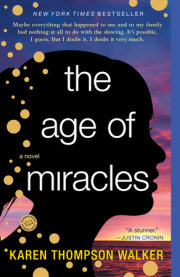chapter 1.
At first, they blame the air.
It’s an old idea, a poison in the ether, a danger carried in by the wind. A strange haze is seen drifting through town on that first night, the night the trouble begins. It arrives like weather, or like smoke, some say later, but no one can locate any fire. Some blame the drought, which has been bleeding away the lake for years, and browning the air with dust.
Whatever this is, it comes over them quietly: a sudden drowsiness, a closing of the eyes. Most of the victims are found in their beds.
But there are some who will tell you that this sickness is not entirely new, that its cousins have sometimes visited ours. In certain letters from earlier centuries, you may find the occasional reference—decades apart—to a strange kind of slumber, a mysterious, persistent sleep.
In 1935, two children went to bed in a Dust Bowl cabin and did not wake for nine days. Some similar contagion once crept through a Mexican village—El Niente, they called it: “the Nothing.” And three thousand years before that, a Greek poet described a string of strange deaths in a village near the sea: they died, he wrote, as if overcome by sleep—or, according to a second translation: as if drowned in a dream.
This time, it starts at the college.
It starts with a girl leaving a party. She feels sick, she tells her friends, like a fever, she says, like the flu. And tired, too, as tired as she has ever felt in her life.
chapter 2.
The girl’s roommate, Mei, will later recall waking to the sound of the key turning in the lock. Mei will remember the squeak of the springs in the dark as her roommate—her name is Kara—climbs into the bunk above hers. She seems drunk, this girl, the way she moves so slowly from door to bed, but the room is dim, and—as usual—they do not speak.
In the morning, Mei sees that Kara has slept in her clothes. The narrow black heels of her boots are sticking out beneath the blankets of the upper bunk. But Mei has seen her do this once before. She is careful not to wake her as she dresses. She is quiet with her keys and with the door. Mei leaves only the lightest possible impression on this space—the comfort of not being seen.
This is California, Santa Lora, six weeks into Mei’s freshman year.
Mei stays away from the room all day. She feels better this way, still stunned by how quickly it happened, how the friendships formed without her, a thick and sudden ice.
Each evening, Kara and the other girls on the floor stand in towels in the bathroom, blocking the sinks as they lean toward the mirrors to line their lips and eyes. Mei can hear them laughing from the desk in her room across the hall, their voices loud above the hum of the blow-dryers.
“It takes time to get to know people,” her mother says over the phone. “Sometimes it takes years.”
But there are certain stories that Mei has not told her mother. Like those boys who came to the door the first week of school. There was a bad smell in the hall, they’d said, and they’d tracked it to this room. “It’s like something died in here,” they’d said, walking in without asking, filling up the narrow room, flip-flops and board shorts, baseball caps low on their heads.
The boys got excited when they began to sniff around Mei’s desk. “That’s it,” they’d said, pressing their hands to their noses. “It’s gotta be something in there.” They’d pointed to the bottom drawer. “What the hell do you have in there?”
It was her mother’s dried cod, which had arrived in the company of three bars of dark chocolate and two lavender soaps.
“My mom makes it,” she’d said. This is one of her mother’s few inheritances from her own mother, Mei’s grandmother, the only one in the family born in China and not San Diego. “It’s fish.”
She knows that these boys refer to her as quiet girl, as in Hey, quiet girl, it’s okay to talk. She does not think of herself that way, as especially quiet, but there she was, as if under their sway: suddenly not talking.
“Jesus,” said the one named Tom, who is taller than the others and plays basketball for the school team. He’d tied a red bandanna around his face, like a worker in a Civil War hospital. “That is foul,” he said.
Every time she remembers it, that bandanna over his mouth, Mei’s face turns hot with the shame of it.
In the end, she dropped the bag of cod down the trash chute at the end of the hall, ten floors down, the scrape of plastic on tin, while the boys gathered around her to make sure.
“I didn’t know they’d be like that,” Kara said later. This is how she learned that Kara was the one who told the boys about a smell in the room, though she’d said nothing at all to Mei.
This is one of the reasons that Mei spends her afternoons at a campus café, where, on this particular day in October, she waits until she is sure her roommate and the other girls will be gone from the floor, their hair dryers quiet, their flat-irons cool, and the girls themselves enmeshed by then in the complicated rituals of their sororities. The boys, she hopes, will be at dinner.
But when Mei gets back to the floor that night, nine hours after she left it, she finds a note, written in red, on the whiteboard that hangs on their door. “We’re leaving,” it says. “Where are you?” These words—it is obvious—are meant for her roommate.
When Mei unlocks the door, she finds Kara still lying where she left her that morning, her body curled toward the wall in the top bunk, her black boots still protruding from the sheets.
“Kara?” she says softly. Outside, the sun is sinking. The sky is clear and turning pink. Mei switches on the overhead light. “Kara?” she says again.
But Kara does not wake. Not to the sound of Mei’s pleading, or to the louder voices of the two paramedics who soon detect—through her badly wrinkled dress—that she is breathing, at least, that she still has a pulse.
Kara sleeps through the screaming of the other girls as they see the way her head rolls back against the stretcher, the way her mouth hangs open, her brown hair falling loose across her face. She sleeps through the screeching of the crickets in the pine trees outside, and through the cool night air on her skin.
Mei stands barefoot on the sidewalk as the paramedics slide the stretcher into the bright bubble of the ambulance, a little roughly, thinks Mei. Be careful, she wants to say. And then the doors swing shut without her, leaving Mei alone in the street.
The paramedics will later report that the girl sleeps through the wail of the siren, too, and the flashing of the lights. She sleeps through the bumps of the potholed streets as the ambulance rushes toward St. Mary’s, where, after several attempts, two doctors find that they cannot wake her, either.
On the other floors of the hospital that night, women labor while the girl sleeps. Babies are born while she sleeps. She sleeps while an old man dies in a distant room, an expected death—his family gathered, a chaplain.
She sleeps through sunrise, and she sleeps through sunset.
And yet, in those first few hours, the doctors can find nothing else wrong. She looks like an ordinary girl sleeping ordinary sleep.
There will be some confusion, later, about what happened to her there, how her heart could have slowed so much without setting off the monitors. But this much is known to be true: over the course of many hours, her shallow breaths turn gradually shallower.
It is hard to say afterward why the final beats of her heart go unrecorded by those machines.
chapter 3.
The girls: they cry and cry, and they do not sleep. They sit around in their slippers and their sweats on the hard carpet of one another’s rooms. They hold hands. They drink tea. If only they had checked on her sooner, they think. If only they had listened when she said she felt sick. They should have known, is the feeling. They should have done something. Maybe, they think, they could have saved her.
The boys turn quiet and they drink even more—cheap beer bought with fake IDs. They keep their hands in their pockets those first few days and just try to stay out of the way of the girls. It is as if the boys can sense it, even in those girls, in their easy closeness and their interlocking arms: the whole history of women and suffering, the generations of practice at grief.
To the girls, it feels wrong to get dressed. It feels wrong to wear makeup. Hair goes unwashed and legs go unshaven and contacts float untouched in solution. They wear glasses, it is then revealed to the boys. More than half of those girls wear glasses.
Her poor mother, the girls say to one another, their knees clutched tight to their chests, as if the shock has turned them even younger. They picture their own mothers. They imagine the phones ringing in their own kitchens, back home, in other towns in other states: Arizona, Nebraska, Illinois. I can’t imagine it, the girls say to one another, I just can’t imagine.
The funeral is in Kansas. It’s too far to go.
“We should do something for her parents,” says one of the girls. They are coming the next day, the girls have heard, to collect Kara’s things. “We should order flowers.”
The girls all agree right away. There is an intense desire to do the proper thing. This feels like their induction. Suddenly, here is life, cut right to its center. Here it is, dismantled to its bones.
They settle on lilies, two dozen, in white. Everyone signs the card.
They can think of nothing else useful to do, but a certain yearning persists. Meanwhile, a new generosity flows between them. How small their other concerns begin to seem, how meaningless, compared. Fights end, and slights are forgiven, and two of the girls reconcile by phone with the faraway boys who they loved so much in high school and who they had thought, until now, they’d outgrown.
But still, the girls want something more. They long to be of use.
When Mei walks down the hall, her arms crossed and her head down and her black hair pulled tight into a braid, the girls notice her as they have never noticed her before.
She shouldn’t blame herself, they all agree. None are sure of her name, the Chinese girl, or maybe Japanese, who lived in the same room as Kara. There is no way she could have known that Kara needed help.
“We should tell her that it’s not her fault,” one of them whispers. “We should tell her that she shouldn’t feel bad.”
But they stay where they are.
“Does she speak English?” says another.
“Of course she does,” says another one. “I think she’s from here, right?”
Somewhere, from another room, there floats the smell of microwave popcorn. No one is going to class.
The basket of lilies arrives that afternoon, but it is less than the girls had hoped, unable, in the end, to accomplish what they had wanted, which is to convey what they can say in no other way, something essential for which they do not know the words.
Kara’s parents: their faces are pale and hollowed. She is a woman in a gray sweater. She is Kara with different skin. The father wears a beard and a flannel shirt. He is a man who thirty years earlier might have been any one of those boys of the floor, slouching in a doorframe, his hands in his pockets like theirs, unaware of what is waiting up ahead.
Slowly, they begin to pack their daughter’s things.
The girls grow shy at the sight of them. They hide out in their rooms, afraid to say the wrong thing. For a while, the only sound on the floor is the harsh crack of packing tape, torn from its dispenser, or sometimes the clinking of emptied hangers, the soft slip of dresses being packed into boxes.
Watching those parents from afar, the girls are quick to mistake all the ordinary signs of midlife—those wrinkles in his forehead, those dark circles beneath her eyes—for evidence of grief instead of age. And maybe, in a way, the girls are right: those faces are proof of the passage of years, and it is the passage of years that has led them right here to this task.
The voices of Kara’s parents are hoarse and wispy, as if they were the ones who were sick. Once, a sudden gasp comes from the mother’s throat, “Stop it, Richard,” she says, and she begins to sob. “You’re ripping it.”
This is the moment when Mei peeks out at the parents, as if watching from a great distance, which, in a way, she is.
The father is struggling to roll up one of Kara’s posters. It’s Paris, black-and-white, tacked to the wall with pushpins, and bought, Mei knows, from the campus bookstore the first week of school. So familiar has the poster become to Mei that she has begun to associate Kara with the girls in the photograph, laughing and glamorous on a cobblestone street in the rain.
“Just stop touching it,” the mother says to the father. “Please.”
After that, the father is quiet.
Mei lingers in the hallway. She should introduce herself to these parents, that’s what her mother would say.
But there is something unbearable about the way that man looks out the window, so like Mei’s own father would, and how he doesn’t seem to know where to put his hands. It is in the way he keeps touching his beard, the way he stands so silently in the corner of that room.
Mei hurries back to her new room without speaking to them.
Only Caleb is brave enough to approach Kara’s parents. Caleb, tall and skinny, brown hair and freckles. Caleb, the English major, a little more serious than the other boys.
The girls watch him shake hands with Kara’s father. They watch the way he holds his Cubs cap at his side while he speaks to Kara’s mother. And the girls—every one of them—long to smooth his hair, which is sticking up on one side and sweaty from where the cap has been.
The girls love him right then for talking to those parents. They love him for knowing what to do.
Copyright © 2019 by Karen Thompson Walker. All rights reserved. No part of this excerpt may be reproduced or reprinted without permission in writing from the publisher.









